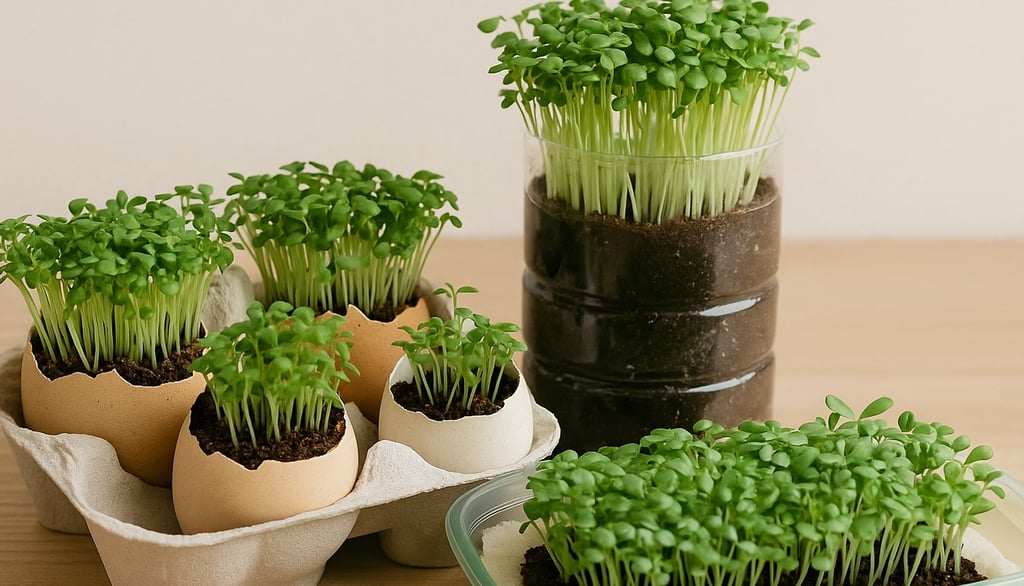Turning Trash into Treasure
Learn how to transform household waste into DIY microgreen farming and support sustainability with Shekwal Farms.
Usman Akbar
8/21/20252 min read


The journey toward sustainability is a process of self-awareness, often starting at home — in the kitchen, the recycling bin, and even the trash. Eggshells that are usually discarded can become perfect seed starters. Old PET bottles? Excellent for creating mini greenhouses. Sustainable farming depends on resourcefulness, and upcycling is its best ally.
As a Shekhwal Farm community, we all urgently need a mindset shift, especially regarding waste. Each container, cup, or broken dish can have a purpose in the garden. Instead of viewing waste as discardable, we should see it as an opportunity for transformation, which encourages creativity and sustainability. Our home garden can be built not from store-bought items but from materials we already possess.
Sustainability Starts at Home
Eggshells: Nature’s Mini Pots
DIY Seed Starters: Rinse and dry eggshell halves, poke a drainage hole, fill with soil, and plant seeds. Ideal for herbs and microgreens.
Calcium Booster for Plants: Crushed eggshells can be added to compost or directly to soil to enrich it with calcium.
Used Tea Leaves & Coffee Grounds
Natural Fertilizer: Sprinkle used tea or coffee around plants to improve soil quality.
Deodorizer: Place dried grounds in a breathable pouch to eliminate fridge or shoe odors.
Exfoliating Scrub: Mix coffee grounds with coconut oil and sugar for a natural body scrub.
Citrus Peels: Cleaning & Repurposing
Citrus Cleaner: Soak orange or lemon peels in vinegar for 2 weeks to make an all-purpose cleaner.
Natural Air Freshener: Simmer citrus peels with cloves and cinnamon on the stove.
Zest Storage: Grate peels before discarding and freeze zest for future baking or cooking.
Plastic Bottles: Mini Greenhouses & Planters
Bottle Gardens: Cut in half and use as planters for herbs, succulents, or microgreens.
Self-Watering Pots: Use inverted bottle tops with wicks to create low-maintenance watering systems.
Greenhouses: Place the top half of a bottle over small seedlings to trap humidity.
Used Cooking Oil
Lamp Fuel: Combine used oil with a cotton wick for emergency oil lamps.
Rust-Proofing: Apply on tools to prevent rusting.
Eco Soap Making: Make natural soaps (requires lye and safety handling).
Onion & Garlic Skins
Plant Mulch: Sprinkle around garden beds to deter pests.
Natural Dye: Boil in water for earthy orange/brown fabric dyes.
Broth Base: Store skins in the freezer and boil into stock.
Old Glass Jars and Containers
Storage Jars: Reuse for spices, grains, or pickles.
DIY Terrariums: Add pebbles, soil, and mini succulents.
Candle Holders: Fill with wax for handmade scented candles.
Bread Ends & Peels
Croutons or Breadcrumbs: Toast and blend for future use.
Fruit Peel Vinegar: Ferment apple peels and cores with sugar water for DIY vinegar.
Banana Peels
Shine Shoes & Leaves: Rub the inside of the peel on leather or indoor plant leaves.
Fertilizer Tea: Soak peels in water for 2–3 days and use as liquid plant food.
Leftover Water
Rice Water: Use the water from washing rice to water plants — it’s nutrient-rich.
Vegetable Boil Water: Let it cool and pour it into your garden to reuse minerals.
Cardboard & Paper Waste
Biodegradable Pots: Use toilet paper rolls or small cartons for seed starting.
Weed Barrier: Lay cardboard under mulch to suppress weeds naturally.
Coconut Shells
Hanging Planters: Clean and drill for rustic-style hanging pots.
Bowls or Candle Holders: Polish the shell for stylish decor pieces.
Leftover Stale Food
Bird Feed: Crushed grains and bread can be left outside for birds.
Compost Starter: Organic kitchen waste like peels, expired veggies, and food scraps enrich compost piles
